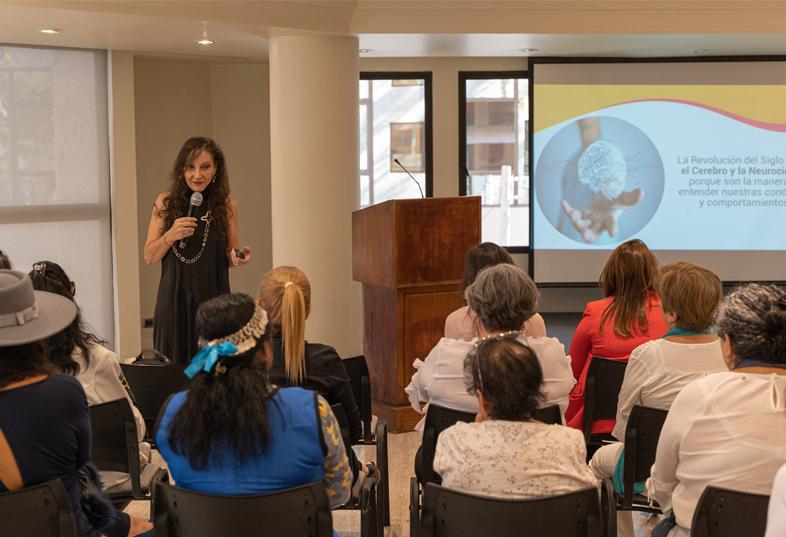
3 minute read
Women in the Private Sector
In Chile, female leadership still has a reduced presence of women in positions of greater responsibility in their companies, but with a strong dynamism in recent years. Gender diversity in management positions in companies has become a challenge for companies, governments and, ultimately, for society in general (ILO, 2015). According to studies by IDB Chile. In this opportunity we have the exclusive interview of the C.E.O Pamela Comparini Méndez of the company Motivar Chile, she was in the context of "La Huella Intelectual Emprendedora" in the month of March as a speaker on Neuroentrepreneurship, we invited her to be part of this edition to meet her as a leader and she told us.
What do you have to have to succeed?
Advertisement
P assion. Conviction. Challenge. Never stop persevering. Take opportunities, as many as possible, no matter if they are small or big. Deep love for wh at you do. Continuous improvement, creativity and, above all, service to people. It is essential to learn to breathe the mind and emotions, it is a work of discipline and very laborious. And of course, to be updated and to take knowledge minute by minute. But what is most important is to know and be aware that the mere fact of being able to breathe makes us succeed; the value we place on our life and our present will make us succeed in whatever we set out to do.
What is the greatest challenge you face as a leader today?
Never be afraid. Always face your fears with a broad mind, even when you think you don't have the necessary skills to face them. You have to be self-confident and study the subject you are afraid of, so you have to use your resources to your advantage and not be prejudiced against anything. As an avant-garde leader, it is essential to understand that change is necessary for the evolution of life, whether in new technologies or other aspects that may change in our environment. A leader who has an open and positive attitude towards change is a person who has a high intelligence, since the brain requires a lot of work to generate change. Going against this transformation, and adapting to it, implies having habits and discipline, which are traits that an integral leader must have.
How do you understand "Leadership"?
I understand Leadership as the greatest capacity to be affectionate, since it is the way to reach the heart of the person. A leader is independent, he understands that he will not do his job well unless he affectionately reaches the heart of those who are in front of him. The person who leads is not the one who has thousands of followers, but the one who reaches the interior of the human being with a genuine attitude of service to motivate people towards a common goal. Leadership must be transformative, connecting with my feelings and those of those around me.
Any phrase that has helped you on your way?
Actually, there are three phrases that are very important to me. The first one comes from Maria Montessori's philosophy, which is: "Niente Senza Gioia", translated as: "Nothing without Joy". The second phrase comes from the Buddhist origin and says "you can always start over again", which should be fundamental in the thinking of leaders. And the third, which is my essence and which I have always liked to say: "We lack nothing, we have everything... because we are breathing", which is closely linked to the first one since it is about the complete appreciation of what I have in my life, about understanding that the true gift of our existence is to be present and to appreciate it to the fullest.
A book that we can read to follow his example?
A book that I always recommend to people is by Krishnamurti and it is called "Letters to the Schools". This book focuses on everything, on all the elements of the life of a human being, and transmits many teachings to live in peace. It is very serious, very deep and very intense, I highly recommend it.
It leaves us with a message for women and men who lead a company or enterprise.
The first thing is to deeply enjoy what you are doing, both the pleasant and the unpleasant, because everything makes sense when you enjoy and enjoy your work as a leader. This way of seeing things gives the immense possibility of being able to understand how important our collaborators are, and how important it is that they enjoy their work as well. Even when their work is routine and unattractive, if as a leader I can transmit enthusiasm to them and value their work, I will get the same employee to value their work. This change of perspective will improve the quality of life of that person. People will never work out of obligation with this way of life, but out of pleasure, and that becomes a very satisfying way of life, which in the end is carried to all environments: social and personal. It is very encouraging for us to see so many companies in Chile and Latin America achieve this purpose, to feel that this true philosophy of life allows well-being in people and greater efficiency in work processes.









